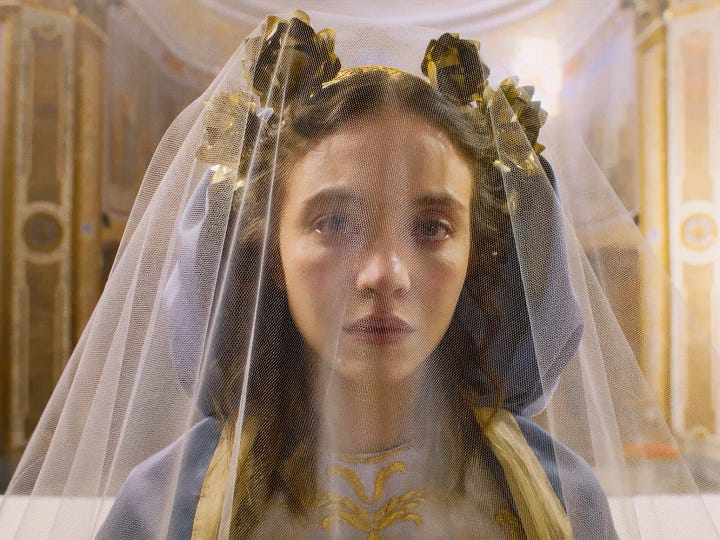“Suffering is love.”
2024 was a ridiculously busy year for me, as the first few months I was focused on promoting a brand new book that I co-wrote with my Horror BFF, Patrick Bromley, that was set to release in the early Spring (In Search of Darkness: The Definitive Look at ‘80s Horror — only a few overage copies remain now for anyone interested). Because I was so busy, I ended up missing out on a few key films that I didn’t get a chance to catch up with until the end of the year (which was right after doing a completely banana pants move in three and a half weeks from California to Nevada). I feel like I missed so much last year because of everything going on, and still have so much to catch up on, and that is why I’m still spending time looking back at some of the films from 2024 that ended up knocking my proverbial socks off.
And Michael Mohan’s Immaculate is one of those films that I only caught up with in late December but I’m still consistently thinking about it, so I thought it would be fun to champion this one even if it was released nearly a year ago now.
To me, Immaculate feels precisely like the kind of movie I would have rented randomly back in the day when you could just go to a video store and pick a tape off the shelf without having any idea of what you’d be getting yourself into. In fact, watching Immaculate gave me similar vibes to an experience I had when I used to sleep over at my Aunt Fran’s house and she’d be like, “Bring a weird horror movie with you.” One night, I randomly chose Dario Argento’s Inferno and I just remember how much we enjoyed the WTF-ery of that experience (I had seen only Suspiria and Tenebrae from him at this point, so the onslaught of randomness was something we both delighted in, even if it’s not one of my favorite Argento movies these days).
And the thing is, Immaculate doesn't even throw that much randomness at you but there is a moment when the story takes a hard left turn once you understand just what is happening, and that’s when things get very interesting. It was in the latter half of the film when it hit me that Mohan and company were making their own ultimate contemporary tribute to Italian genre cinema with their work here. And I could not have loved that more.
If you haven’t seen Immaculate yet, here’s a bit of a rundown: a young American nun named Cecilia (Sydney Sweeney) is traveling to Italy to live at a convent that tends to dying nuns. Cecilia has believed that being a servant of God is her calling ever since she was a small child after she survived a horrific incident where she fell through some ice and was brought back to life after being dead for several minutes. Purpose-driven, Cecilia feels that God wants her to be a vessel for good in this world, but has no idea that those in power over her — particularly Father Sal Tedeschi (Álvaro Morte) and Mother Superior (Dora Romano) — have their own plans for her that will challenge Cecilia’s faith in ways she could have never imagined. The virginal Cecilia ends up miraculously pregnant just a short time after her arrival, and as her pregnancy progresses, the young nun discovers the sinister secrets of her new home and begins to comprehend the enormity of the “miracle” growing inside of her.
There’s a lot I loved about Immaculate but one of the biggest aspects that really resonated with me is how it does feel like this cinematic love letter to the Italian genre films of the ‘70s and ‘80s. Even the filming location of the convent has a lot of cinematic history behind it, as Villa Parisi was also featured in films like Mario Bava’s A Bay of Blood, Blood For Dracula (aka Andy Warhol’s Dracula), and Burial Ground (which was sometimes known as Zombie 3).
There are other components to Immaculate that immediately connected with me as someone who loves Italian horror, like the character of Sister Gwen (Benedetta Porcaroli) who immediately reminded me of Sara from Argento’s Suspiria, as both characters befriend each film’s American protagonist, and they both do their best to get these women to understand that there’s something bad happening to them before it’s too late. There’s even a moment when Father Tedeschi dons some black leather gloves and I love that my brain immediately went “Giallo Gloves!” even if Immaculate is in no way a Giallo film. But those are details that I will always appreciate.
From a filmmaking standpoint, Immaculate is spectacularly brought to life through the work of cinematographer Elisha Christian who creates a gorgeous viewing experience from start to finish. The way the camera captures the naturalism of the Italian countryside is so beautiful, and how the camera soaks up every detail of the convent (more on that soon) is just astonishing to behold on subsequent rewatches. These visuals invite feelings of tranquility that are in direct juxtaposition to what’s often happening in Immaculate, which I think only helps set the stage for everything to come in the movie’s third act.
It’s also evident through the iconography utilized throughout Immaculate that director Michael Mohan was looking to really pull back the layers on Catholicism and demonstrate how there are these undercurrents of misogyny rippling through this religion even when women seem to be celebrated. In a movie that features several disturbing moments, I think one of the most unsettling scenes is when Sister Cecilia is taking her vows and has to kiss Cardinal Merola’s (Giorgio Colangeli) ring. Between the intimate framing of that sequence, and the way the camera holds on that moment where Cecilia’s pursed lips are on the garish piece of jewelry, this scene is a striking reminder that even though these women are making a promise to God, there are still these men wielding power over them that they must submit to as well.
Another horrifying scene in Immaculate is when Cecilia is being questioned about her chastity by Father Tedeschi, where nearly the rest of the people in that room are men as well (Mother Superior is there too, but she’s hardly a factor). As the bewildered young nun is struggling to understand just what is happening to her, she’s watching these men debate the authenticity of her virginity, with Doctor Gallo (Giampiero Judica) going so far as to discuss the condition of her hymen when she was examined upon her arrival at the convent. This is a moment of pure horror as this young women has to helplessly sit there while men stand around discussing her reproductive health (which is unfortunately something that feels all too relatable these days).
There’s also the scene when Sister Cecilia is being celebrated once her “immaculate conception” has been discovered, and I love how that scene recreates the art often associated with the Immaculate Heart of Mary devotion through the presentation of Cecilia, all dressed up and on display. This poor woman only wanted to do the work of God and now she’s being forced to carry out the will of His followers, and the inherent sadness on Sweeney’s face throughout that entire sequence is utter perfection.


Also, let’s talk about Sydney Sweeney and Immaculate. I have admittedly never watched Euphoria but she had been in a few indie horror movies that I have enjoyed over the years (Nocturne, Along Came the Devil as well as a film that I got to handle publicity for years ago, Spiders 3D from Tibor Takacs), and I really enjoyed when she popped up in Netflix’s vampire actioner Night Teeth as well. It’s remarkable that Sweeney has been working in the industry for over 16 years now but Immaculate feels like her coming out party in so many ways. She is an absolute force to be reckoned with in the movie, and I love how hard she goes, specifically in the last 5 minutes where Cecilia’s dogged determination is unwavering which culminates in one of the most shocking and applause-worthy moments in 2024 horror.
What’s also very cool to me is how hard Sweeney fought for Immaculate over the years. This was a movie that was supposed to go into production back in 2014 (and apparently had a different focus back then, as it was centered around a group of teen girls then), but it ran into a number of issues. Sydney stepped up, bought the rights to the film, and then developed it with director Michael Mohan who she had worked with on The Voyeurs. Her commitment to this project is felt both onscreen and off, and it just goes to show that good things do indeed come to those who wait.






